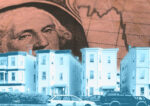Housing affordability is a nationwide issue, but it’s particularly acute in Boston, which has seen its number of affordable listings plummet from last year.
A mere 4.7 percent of listings in the Boston area were deemed affordable in a recent analysis by Redfin, the Boston Business Journal reported. Redfin determined that a listing was affordable if a typical monthly mortgage payment represented no more than 30 percent of the local median household monthly income.
Last year, Greater Boston had an affordability rate of 8.7 percent; the sudden decline is largely thanks to rising home prices and high mortgage rates.
Boston is also significantly more unaffordable than some of the other major cities in New England. Providence has an affordability rate of 6.1 percent, according to Redfin, while Worcester came in at 7.6 percent.
In fact, Boston is more unaffordable than roughly 75 percent of the country’s largest metro areas, with the usual suspects Los Angeles, New York, Miami and San Francisco topping Boston.
Roughly 16 percent of the nation’s listings were deemed affordable in Redfin’s analysis, down from 21 percent last year. Prior to the pandemic, that share was above 40 percent and a decade ago, around 50 percent.
In Boston, the influx of private investors is causing concern for affordability advocates. From 2004 to 2018, one in five home listings sold to private investors, according to data recently released by the Metropolitan Area Planning Council. Private investors’ share of purchases spiked from 16 percent in 2004 to 23 percent five years ago.
Advocates for affordable housing have expressed concern on how investors’ purchases are affecting working and middle-class individuals who historically purchased small multifamily properties.
— Holden Walter-Warner
Read more



